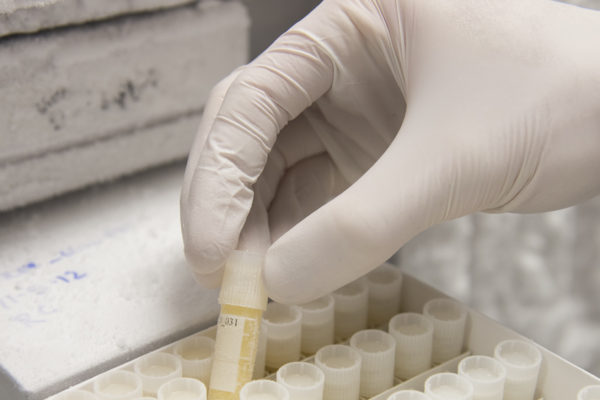A person’s diet, acidity of urine may affect susceptibility to UTIs
The acidity of urine — as well as the presence of small molecules related to diet — may influence how well bacteria can grow in the urinary tract, a new study shows. The research, led by Jeffrey Henderson, MD, PhD, at Washington University School of Medicine in St. Louis, may have implications for treating urinary tract infections, which are among the most common bacterial infections worldwide.
Some brain cells are better virus fighters
Viruses often spread through the brain in patchwork
patterns, infecting some cells but missing others. New research at the School of Medicine helps explain why: Natural immune defenses that resist viral
infection are turned on in some brain cells but switched off in others. The white arrows in the picture highlight infected cells in a mouse brain.
Babies’ susceptibility to colds linked to immune response at birth
Innate differences in immunity can be detected at birth, according to new study from Washington University School of Medicine in St. Louis. First author Kaharu Sumino, MD, and her colleagues say babies with a better innate response to viruses have fewer respiratory illnesses in the first year of life.
Countering Crohn’s Disease
Patients treated in the GM-CSF pilot study showed a decrease in inflammation: an inflamed colon before treatment (top) and after, showing no pathologic abnormality.Researchers at Washington University School of Medicine in St. Louis continue to make progress in finding a potential treatment for Crohn’s disease, a chronic and serious inflammatory disease of the gastrointestinal tract that affects about half a million people in the United States. Later this month, the research team of Joshua Korzenik, M.D., assistant professor of medicine, and Brian Dieckgraefe, M.D., Ph.D., also an assistant professor of medicine in the division of gastroenterology, will present preliminary data from patients with moderate to severe Crohn’s disease who were treated at 33 centers around the United States. Patients who received daily injections of a drug called GM-CSF (granulocyte macrophage colony stimulating factor), which stimulates the activity of certain cells in the immune system, tended improve. And although the data have not yet been presented, the results from the placebo-controlled phase II treatment study were positive.

